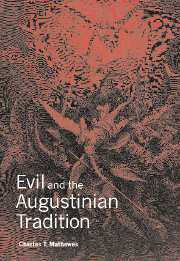Book contents
- Frontmatter
- Contents
- Acknowledgments
- List of abbreviations
- Introduction: reaching disagreement
- I PRELIMINARIES: EVIL AND THE AUGUSTINIAN TRADITION
- II GENEALOGY: REMEMBERING THE AUGUSTINIAN TRADITION
- III THE CHALLENGE OF THE AUGUSTINIAN TRADITION TO EVIL
- 5 Demythologizing evil
- Conclusion: realizing incomprehension, discerning mystery
- Works cited
- Index
5 - Demythologizing evil
Published online by Cambridge University Press: 22 September 2009
- Frontmatter
- Contents
- Acknowledgments
- List of abbreviations
- Introduction: reaching disagreement
- I PRELIMINARIES: EVIL AND THE AUGUSTINIAN TRADITION
- II GENEALOGY: REMEMBERING THE AUGUSTINIAN TRADITION
- III THE CHALLENGE OF THE AUGUSTINIAN TRADITION TO EVIL
- 5 Demythologizing evil
- Conclusion: realizing incomprehension, discerning mystery
- Works cited
- Index
Summary
The question why there is evil is not a theological question, for it presupposes that it is possible to go back behind the existence that is laid upon us as sinners. If we could answer the question why, then we would not be sinners. We could blame something else. So the “question why” can never be answered except by the statement “that” which burdens humankind so completely.
The theological question is not a question about the origin of evil but one about the actual overcoming of evil on the cross; it seeks the real forgiveness of guilt and the reconciliation of the fallen world.
Dietrich Bonhoeffer 1997, 120We have seen that, despite many critics' claims to the contrary, a broadly Augustinian interpretation of and response to evil's challenge remains viable and indeed of considerable use to contemporary theology and ethics. The Augustinian commitments developed by Niebuhr and Arendt work to promote social practices and individual attitudes which respond to evil, collectively, by deepening our worldly participation – not just as a response to evil, but as constitutive of human flourishing simpliciter. And we saw that this understanding of evil derives from an essentially positive theological ontology, one built around an essentially “incarnational” core.
- Type
- Chapter
- Information
- Evil and the Augustinian Tradition , pp. 201 - 238Publisher: Cambridge University PressPrint publication year: 2001



